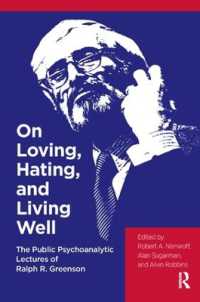- ホーム
- > 洋書
- > 英文書
- > Literary Criticism
Full Description
This book investigates literary representations and self-representations of people with cosmopolitan identities arising from mobile global childhoods which transcend categories of migrancy and diaspora. Part I focuses on the ways in which cosmopolitan characters are represented in selected novels, from the debauched Anthony Blanche in Evelyn Waugh's classic Brideshead Revisited, to the victimized Ila in Amitav Ghosh's The Shadow Lines, to John le Carré's undefinable spies. Part II focuses on self-representations of people with a cosmopolitan upbringing, in the form of autobiographical narratives by well-known authors such as Barack Obama and Edward Said, along with lesser-known writers, all of whom "write back" to the ways in which they have at times been stereotyped and othered in literary fiction and public discourse.
Contents
Acknowledgments
Introduction
1 Working Definitions
2 Literature Review
2.1 On Cosmopolitanisms and Mobilities
2.2 On Third Culture Kids (tck s)
2.3 On Literary Cosmopolitanisms
3 Overview of the Book
3.1 Part 1: Beyond Diaspora in Literary Fiction
3.2 Part 2: Beyond Diaspora in Autobiographical Narratives
Part 1
Beyond Diaspora in Literary Fiction
1 Cosmopolitan Attitudes and Cosmopolitan Identities in Amitav Ghosh's The Shadow Lines
1 The Shadow Lines and National Borders
2 Cosmopolitan Attitudes and Cosmopolitan Identities
3 Ila as a "Third Culture Kid"
4 Gender, Nationalism, and Cosmopolitan Identity
5 Conclusion
2 English and Cosmopolitan Identities in Evelyn Waugh's Brideshead Revisited, and in John le Carré's The Night Manager and Agent Running in the Field
1 Englishness and Cosmopolitanism in Evelyn Waugh's Brideshead Revisited (1945)
2 Cosmopolitan Characters as English Spies in John le Carré's The Night Manager (1993) and Agent Running in the Field (2019)
3 Conclusion
3 Identity, Nationality, and Cosmopolitanism in Michael Ondaatje's The English Patient
1 Names, Tribes, and Nationalities in the Desert and in the Villa
2 Selfhood and the Construction of Group Identity
3 The Feuds of the World
4 Conclusion
4 The Expatriate Child in Contemporary Fiction: Forward in Time in Eileen Drew's The Ivory Crocodile and Backward in Time in Jane Alison's Natives and Exotics
1 Introduction
2 White Guilt in Eileen Drew's The Ivory Crocodile
3 Discontinuity and Disruption, Borders and Boundaries, and the Kindness of Servants
4 Citizenship, Identity, and Transplantation
5 Recurring Motifs and Their Thematic Significance
6 Being Inquisitive instead of Acquisitive in Approaching the Natural World
7 Conclusion
Part 2
Beyond Diaspora in Autobiographical Narratives
5 Autobiography, Identity, and the Narration of Global Childhoods: Edward Said and Nadia Owusu
1 The Nature of Autobiography and Its Relation to Fiction
2 Identity and Autobiography
3 Edward Said
4 Nadia Owusu
5 Conclusion
6 "Third Culture Kid" Memoirs: Constructing an Alternative Category of Identity
1 Recurring Themes and Identity Construction
2 Narrative Features
3 Conclusion
7 The Expatriate Child and the Patriarch: Identity and Father Figures in Three Memoirs of Growing Up Global
1 Framing the Narratives
2 The Imperial Context
3 Fathers
4 Mothers and Gender Issues
5 Mobility, the Expatriate Child, and (Re)Patriation
6 Construction of Identity
7 Conclusion
Conclusion
Bibliography
Index






